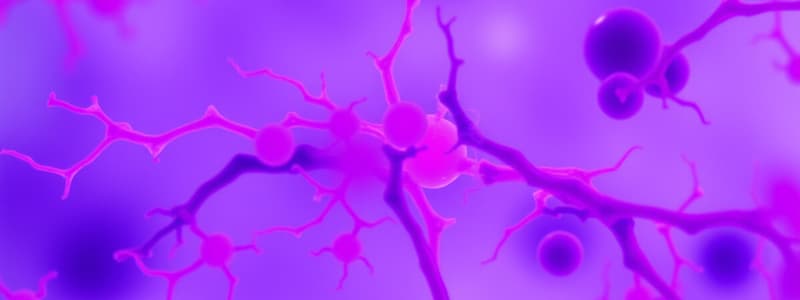Podcast
Questions and Answers
What is likely to happen to cells when nutrition is restricted?
What is likely to happen to cells when nutrition is restricted?
- Cells become more efficient
- Cells may undergo atrophy (correct)
- Cells differentiate into muscle cells
- Cells increase in number
Is increased heart size commonly due to hypertrophy in cardiac muscle?
Is increased heart size commonly due to hypertrophy in cardiac muscle?
True (A)
What is ischemia?
What is ischemia?
Decreased blood flow to cells
Denervation atrophy occurs when the target lacks _____ and feedback.
Denervation atrophy occurs when the target lacks _____ and feedback.
What is one example of a situation that may lead to disuse atrophy?
What is one example of a situation that may lead to disuse atrophy?
Match the type of atrophy with its description:
Match the type of atrophy with its description:
What does hypoplasia refer to?
What does hypoplasia refer to?
Hypertrophy indicates an increase in cell size.
Hypertrophy indicates an increase in cell size.
What is hyperplasia?
What is hyperplasia?
Flashcards are hidden until you start studying
Study Notes
Cell Response to Stress, Injury, & Aging
- Inadequate nutrition triggers cellular atrophy, facilitating survival with limited resources.
- Cell efficiency: Most cells are capable of remarkable adaptability when faced with increased demands, such as size increase or proliferation.
- Cells can exhibit reversible changes in response to adverse conditions through gene expression modulation.
- Adaptations may involve changes in cell size, number, and differentiation into different cell types.
- If stressors are insurmountable, cells may undergo apoptosis or necrosis, leading to cell death.
Atrophy
- Atrophy refers to a reduction in cell size, impacting the overall size of organs or tissues.
- Advantages of atrophy include decreased oxygen consumption and resource utilization due to smaller and fewer organelles.
- Common types of atrophy include disuse atrophy (muscle cells affected by immobility or casting) and denervation atrophy (loss of nerve stimulation).
Hypertrophy
- Hypertrophy is the increase in organ or tissue size due to heightened demand, primarily observed in muscle tissues like cardiac and skeletal muscles.
- Normal physiological hypertrophy occurs with increased workload, such as from exercise.
- Adaptive hypertrophy is seen when there is a thickening of an organ, e.g., urinary bladder due to outflow obstruction.
- Compensatory hypertrophy can occur, e.g., the enlargement of one kidney following the removal of another.
Hyperplasia and Related Terms
- Hyperplasia involves an increase in cell number, typically in organs capable of mitotic division, excluding muscle cells and neurons.
- Metaplasia is characterized by the reversible transformation from one cell type to another.
- Dysplasia signifies deranged cell growth, resulting in abnormal cell shapes, sizes, and organization.
Hormonal Influence on Atrophy and Hypertrophy
- Hormonal changes can significantly impact tissue and organ size, notably:
- Decreased estrogen levels, such as during menopause, can lead to breast and reproductive organ atrophy.
- Testosterone abuse may cause testicular atrophy.
Studying That Suits You
Use AI to generate personalized quizzes and flashcards to suit your learning preferences.



